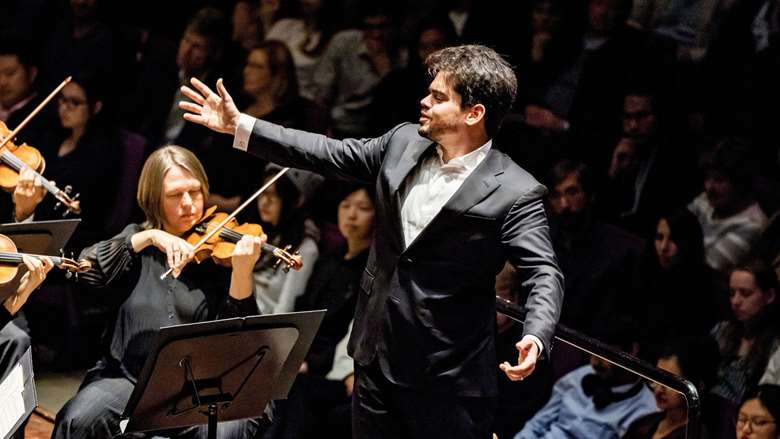Bruckner's Symphony No 7, an introduction by Lahav Shani
Monday, February 19, 2024
Lahav Shani on the lyricism of this work and the human emotion it conveys

Bruckner was influenced by the music he heard as a young man growing up in central Europe. His music has a sense not only of looking back and encompassing the history of music, but also very much looking forward and seeing the future, looking not just at what Wagner was doing around that time but also at what Mahler and even Schoenberg would do. There is no sentimentality in this music. It has passion, but this is not the main quality. One can talk about Bruckner’s relationship with religion, with God, and with spirituality, and perhaps this has the most influence on the atmosphere of the music, but there are also beautiful melodic lines and a sense of cantabile and continuation.
The wonderful atmosphere that Bruckner creates at the beginning of the Seventh Symphony is something he does also in some of his other symphonies. Daniel Barenboim calls it the relation between silence and sound. There is the obvious influence of Wagner, especially in the second movement, and it’s well known that he was thinking about Wagner as he wrote that movement. He even added Wagner tubas, which almost no other composer had used before that time. In addition to this tribute, the end of the second movement is like a cry in response to the notion that Wagner has died. The third movement is a dance very much influenced by Austrian folk music. Sometimes the movement is played in a very heavy way, but my own feeling is that there’s lightness and groove to this music. It has character and bite – and not just this movement, but the other movements as well.
Sometimes the third movement is played in a very heavy way, but I feel that there’s lightness and groove to this music
When I look at the score, I feel I understand what Bruckner wanted to hear and why. Still, there is a big difference between what’s going on in the mind of a composer and the acoustic reality, the physical reality. There are things that a conductor has to decide in the moment in terms of tempo, dynamics and balance. And my feeling is that if we could ask Bruckner for advice on what to do, he would say, ‘Well, judge with your ears.’ A composer cannot foresee the many different vectors that might transpire in a piece, or the many different questions it might raise. Should I continue this line or should I stop here and move to something else? Is this too much? How should I balance this? Am I giving too much importance to one voice at the expense of the other? The performer is effectively continuing to make the choices that the composer has already made. Sometimes you have to try it in real life and then come to decisions. You also have to be very clear with yourself as to how the structure is built, and how you really want to proceed. I always try to look at it as a whole – looking at the whole movement as one thing and the whole symphony as one thing in order to create a sense of continuity.
As to the sound, one can learn so much from conductors such as Wilhelm Furtwängler, Herbert von Karajan and Otto Klemperer. It’s so inspiring to listen to them because there was a certain way to perform the music back then and you can think about it and find new perspectives. I also like to think about the lyricism of this music and how to find the most natural way for me and the orchestra to produce it. It’s my feeling that over the years, performances became very clean and precise and that expression sometimes became a little bit sterilised. In my recording of the second movement, I occasionally ask the violins to slide very softly to make it much more like a singing voice, because I find a lot of opportunity for flexibility in the music and I think so much beauty comes out of it when you allow this flexibility and allow yourself this freedom and this singing quality.
I never try to impose a specific interpretation on the music, even if I have my own subjective ideas about it. I much prefer to let the music flow and develop and change, and let every listener go with their own imagination. I think a good performance creates a certain atmosphere and helps the listener concentrate so that they can really listen to every note, and follow and understand what’s going on – then they can create their own interpretation in their mind. There is no right or wrong. Bruckner is not here for us to ask if he meant this or if he meant something else. He wrote music that is so much beyond these things, music that conveys such deep human emotion.
Interview by Christian Hoskins
This article originally appeared in the January 2024 issue of Gramophone. Never miss an issue of the world's leading classical music magazine – subscribe today

















